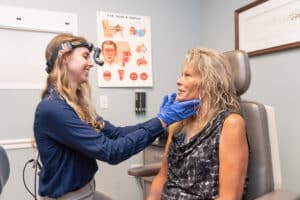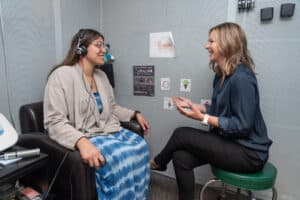Pediatric Hearing Loss
pediatric hearing
Pediatric hearing loss can be managed through a comprehensive treatment strategy designed by a multidisciplinary team.
Early intervention is crucial.
Depending on the degree and cause of the hearing loss, treatment options can vary. Hearing aids, designed to amplify sound, are often the first choice for many forms of hearing loss. These devices come in many styles, sizes, and even colors to suit the child’s preferences and needs.
For most children, hearing loss is associated with ear infections and/or fluid in the ears which can be an acute episode or chronic/recurrent in nature. Many of these children can be treated medically to improve their hearing, but some children with chronic issues may benefit from a procedure called myringotomy and tubes to help improve their hearing.
For severe or profound hearing loss, cochlear implants could be an option. They bypass the damaged part of the ear and stimulate the hearing nerve directly. Speech and auditory therapy are typically used in conjunction with these devices to help children learn or improve listening and speech skills. In some cases, treatment may involve medication or surgery if the hearing loss is caused by infections, anatomical abnormalities, or tumors.
It’s crucial to work closely with audiologists, otolaryngologists, speech therapists, and educators for the best outcomes.
Categories of Hearing Loss
Hearing loss in children can be categorized based on several parameters. One is by the location of damage in the auditory pathway. Conductive hearing loss involves the outer or middle ear, where sound is not adequately conducted through to the inner ear. It is often caused by ear infections, fluid in the middle ear, or malformations of the ear structures. Sensorineural hearing loss results from damage to the inner ear or auditory nerve and is often due to genetic causes, infections, or exposure to loud noise. Mixed hearing loss involves both conductive and sensorineural components.
Another classification is based on the degree of hearing loss, categorized as mild, moderate, severe, or profound. This is measured in decibels hearing level (dB HL).
Hearing loss can also be characterized by the time of onset – prelingual (before speech develops) or postlingual (after speech develops), and the pattern of hearing loss – bilateral (both ears) or unilateral (one ear), and progressive (worsens over time) or sudden.
Symptoms of Pediatric Hearing Loss
Pediatric hearing loss can manifest in several ways, and symptoms might vary based on the child’s age, type, and degree of hearing loss.
Generally, children with hearing loss may have the following signs and symptoms:
- They may not respond to sounds or their name
- They may have delayed speech and language development
- They may exhibit unclear speech
- They often ask people to repeat themselves
- They may frequently turn up the volume of TVs or other audio devices,
- They have difficulty following conversations especially when background noise is present
- They may seem inattentive or even behave disruptively due to frustration.
- Some children may frequently complain of ear pain, tinnitus (ringing in the ears), or balance issues, depending on the cause of the hearing loss.
- In infants and newborns, missing the key developmental milestones can be an early indicator of hearing loss.
Hearing Loss In Newborns/Infants
In newborns and infants, hearing loss can be particularly challenging to identify due to their limited communication ability. However, certain signs might indicate potential hearing issues. Newborns with normal hearing usually startle or blink at loud noises, while those with hearing loss might not react.
By three months, babies usually recognize a parent’s voice, and by six months, they begin to imitate sounds and babble. If these milestones are delayed or missed, it could signal hearing problems. Infants with normal hearing typically turn their head or eyes towards sound sources; an absence of such a response might suggest hearing loss.
Additionally, if an infant does not seem soothed by familiar voices or does not respond to sounds in their environment like a ringing phone or a barking dog, it could be a sign of hearing loss.
Hearing Loss in Toddlers
For toddlers, the manifestation of hearing loss often relates to speech and social interaction. Delayed speech is a significant symptom; toddlers with normal hearing typically say several words by the age of 2. If they only use gestures or seem to be ‘babbling’ past this age, it might indicate hearing loss.
Toddlers with hearing loss may also have unclear speech, difficulty forming sentences, or use incorrect verb tenses. They may frequently ask for repetition, appear inattentive, or respond inappropriately to questions (not due to misunderstanding but because they didn’t hear properly).
They may also exhibit behavioral changes such as frustration or tantrums, often because they’re struggling to communicate or understand. Social isolation or reluctance to participate in group activities can also be a sign, as hearing loss can make these situations challenging for them.
Hearing Loss in Teens
In teens, signs of hearing loss can often be misconstrued as inattentiveness or disinterest. They might frequently ask others to repeat themselves, struggle with understanding conversations, especially in noisy environments, or mishear what people are saying, leading to inappropriate responses.
Difficulty hearing high-pitched sounds, such as the voices of females or young children, or consonants in speech, is another common symptom. They may also rely heavily on reading lips or watching people’s faces when they speak.
Teens who have hearing loss may have the tendency to turn up the volume on their devices louder than normal. They might also exhibit tinnitus, a condition characterized by ringing or buzzing in the ears. Some might withdraw from social situations or seem less engaged in conversations because they’re having trouble hearing.
Treatment for Pediatric Hearing Loss
Treatment for pediatric hearing loss involves a team approach, with otolaryngologists (ENT specialists) playing a key role. Depending on the cause, treatment can range from medication, surgery, to hearing aids and cochlear implants.
For conductive hearing loss due to middle ear infections, ENT specialists often prescribe antibiotics. If fluid buildup persists despite medication, a minor surgical procedure to insert tubes in the ear may be recommended.
In cases of sensorineural hearing loss, ENT specialists often work alongside audiologists to manage the condition. Hearing aids or cochlear implants may be suggested based on the severity of hearing loss.
Cochlear implants are generally reserved for severe to profound hearing loss. ENT surgeons perform the implant surgery, where an electronic device is placed in the ear to directly stimulate the auditory nerve.
Furthermore, if hearing loss results from structural abnormalities in the ear, ENT surgeons may correct these issues via surgery.
In every case, early detection and intervention are crucial for the best outcomes, and ENT specialists play a vital role in guiding the diagnosis, treatment, and management process.
Frequently Asked Questions About Pediatric Hearing Loss
Contact Us Today!
At Boulder Valley Ear, Nose & Throat Associates, we provide the highest quality patient care in a friendly, professional atmosphere. We emphasize personalized customer service, availability, efficiency, honesty and integrity, and attention to detail. We strive to do things the right way at every level, all the time.
If you know or suspect your child has hearing difficulties, timely evaluation and intervention is of utmost importance in preserving your child’s hearing and preventing complications. Schedule an appointment with one of our caring and experienced ENT specialists for a full evaluation today!










